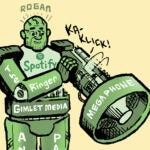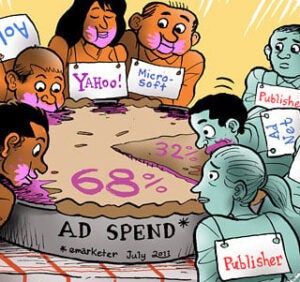 By Kelly Liyakasa and Alison Weissbrot
By Kelly Liyakasa and Alison Weissbrot
Agencies are becoming more consultative. Consultants are buying creative agencies. And systems integrators are dabbling in client strategy.
“Everyone talks about online vs. offline media or creative vs. media, but when a marketer wants to change the consumer journey, we’re talking new operating models and governance,” said Glen Hartman, senior managing director for digital transformation at Accenture Interactive. “That involves the CFO and the C-suite.”
Hartman joined a handful of other agency execs, consultants and enterprise company Oracle for a discussion Wednesday in New York City. Though not officially associated with Advertising Week, it was one of several events in town that addressed the slow-motion collision of agency and consulting services.
Although the roundtable event was intended to discuss the evolving role of an “agency partner,” it quickly escalated into a debate about marketer demands.
Traditionally client organizations had a disconnect between the C-suite’s goals, characterized by a focus on P&L and business objectives, and the CMO’s emphasis on brand.
“CMOs have been buying technologies for the last 20 years, but they hated capital expenses,” said Ed See, principal for Deloitte. “First-party data changed that. The CMO wanted to be involved in activating lookalikes of their best customer. The brand used to be their best asset, and now it’s their data.”
“We went from buying media to buying audiences on almost on an individual level,” added Tim Haarmann, EVP and head of account management for DigitasLBi. “We started advising clients on way more than media.”
And as more platforms and publishers offered CRM and audience matching – Facebook, Twitter, Google, Pinterest and Snapchat, among them – it became commonplace for media agencies to borrow the tactics used by early database marketers.
“The old world of database marketing became the MVP in the new era of digital media,” said Gerry Bavaro, SVP of enterprise solutions and digital strategy for Merkle. “Those who have made data relevant to creative planning and who can tie it back to identity are winning.”
Meanwhile, at the nearby NASDAQ Marketsite venue, execs from Deloitte, IBM and Zeta Interactive bantered in a session titled “The Great Debate: Agencies Versus Consultancies.”
AdExchanger Daily
Get our editors’ roundup delivered to your inbox every weekday.
Daily Roundup
“The culture of analytics, data and technology is something the agencies are trying to get more comfortable with, but it’s a leg up consultancies have,” said David Feldman, Partner at IBM and former agency executive.
Consultancies can help marketers navigate larger organizational shifts, while agencies are there to drive campaigns, said Mark Singer, principal at Deloitte Digital.
“An agency might get tasked to launch a product in the market,” he said. “We’ll get tasked with pricing that product, marketing that product and helping it grow the market.”
But as navigating digital channels becomes a larger business problem for marketers, CMOs need help with much more than just buying and placing media. They need to restructure their massive organizations to play in the digital space.
“What’s exciting for consultancies is the opportunity to work with clients on operating problems, and redefining how content is produced,” Feldman said.
But agencies have storytelling and brand building at their core, whereas management consultancies just don’t, said Suzanne Darmory, executive creative director at Zeta Interactive.
“The difference is that, fundamentally, we put creative before we put the solution,” she said. “Consultants put the solution and end up with the creative.”
Talent Considerations
Of course creative is only as good as the talent on board, and agencies are having trouble
“Our business models are not constructed against clients,” said Deloitte’s Singer. “If we lose a client, we don’t fire half of our people. We’re about retention and growth and bringing people along.”
And management consultancies give talent the opportunity to solve “meatier business problems,” Feldman argued. He added that these companies may not seem an obvious draw for creative talent, but that’s because they’re part of an organization with so many teams.”
“We hire lots of creatives who come to us because they want to be challenged with more than just creating a storyboard or coming up with a brand idea,” he said. “It may seem like were not focused on creative because it’s not 100% of our business, but it’s there in pockets. … You’re seeing companies like IBM becoming agencies of record now for real brands.”
For many brands, however, the choice between working with an agency or a management consultancy isn’t necessarily either/or, an acknowledgement that agencies probably aren’t going anywhere any time soon.
“Most large clients have both agencies and consultancies in the mix,” Singer said. “The lines are increasingly blurring and will continue to blur.”
Agencies And Consultants Encounter New “Asks”
As one example of consultant-driven “business transformation,” Accenture Interactive’s Hartman described a scenario where a telco’s CMO and chief digital officer asked the consultancy to help optimize paid search because leads and clicks were down.
As it turned out, a majority of leads captured through paid search were ultimately converting through the customer’s call center, so digital wasn’t getting the credit it deserved while “the guys in the call center were getting fruit baskets every week,” Hartman said.
Accenture Interactive created an attribution solution and tested how the digital team could log its influence in the funnel, such as through click-to-call techniques.
“It required a whole new workflow involving digital, offline and meetings with the COO and sales officer,” he said. “A business transformation project came from the question, ‘Can you optimize our paid search?’”














